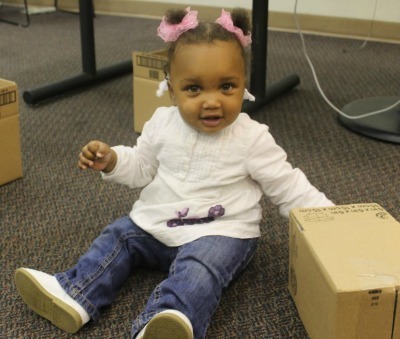By Allison Nanni
Under their mothers’ chairs, Elijah and Kamrey explore an assortment of empty cardboard boxes and toys placed on the floor for their amusement. The 10- and 12-month-old babies are the youngest participants in a recent session of “Talk With Your Baby.” This five-session class is designed to help parents, grandparents and caregivers to maximize communication and early literacy with children ages 0 to 3.
With support from Memorial Children’s Hospital and PNC Bank’s Grow Up Great initiative, Talk With Your Baby is offered throughout the county at various nonprofit organizations. The University of Notre Dame’s Robinson Community Learning Center (RCLC) offers the session at its location and coordinates neighborhood- and agency-based classes throughout the community.
Research shows that speaking frequently with children in the first three years of life builds the brain architecture needed later to support reading and thinking skills. “Lots of talking will help your child do better in reading, in social relationships and in life,” says Stephanie, the group’s facilitator. “Some families are talkative. The parents and caregivers talk with babies a lot — imitating facial expressions and sounds, giving a ‘play-by-play,’ telling stories and singing.”
Other families don’t speak much with their babies. The parents may not understand how important it is or they may not have grown up with that experience. The research also indicates that children from talkative families may have heard 30 million more words directed to them by age 3 than children from less-talkative families. The more words the children had heard by 3, the better they did on tests of cognitive development.
Kris Arizmendi, the program coordinator of “Talk With Your Baby,” describes her own upbringing: “My parents wanted the best for me and my siblings, but like many parents, they were unfamiliar with the importance of literacy for babies and toddlers. They didn’t realize that they could be their children's first academic teachers through reading and talking.”
Arizmendi is now mother to a 5-year-old and says that from the beginning, she and her husband have enjoyed reading daily, taking trips to the library and visiting museums and the theater with their daughter. Especially in the beginning, the new mother enjoyed speaking “parentese,” a language characterized by animated, singsong tones to engage babies.
“Some people feel silly [speaking parentese],” says Arizmendi, “but the elongation of the vowels is a way of modeling for your child how to begin to learn to make all of those thousands of sounds themselves. It’s really the beginning of language formation.”*

For more information on upcoming sessions of Talk With Your Baby, check out www.talkwithyourbaby.org or facebook.com/talkwithyourbaby.
Kamrey Rose Winfield, daughter of Terrence and Ramal Winfield, has been participating in "Talk With Your Baby" at the Robinson Community Learning Center with her mother.